Welcome to the future of content creation! In a world where time is precious and creativity knows no bounds, Artificial Intelligence has become an invaluable ally for writers and marketers alike. With AI-powered tools continuously evolving, it’s time to unveil the crème de la crème – the 10 Best AI Content Generation Tools of 2023! Whether you’re seeking automated blog posts, AI for article writing, social media captions that captivate, or even mind-blowing video scripts, this comprehensive list will empower you with cutting-edge technology that takes your content game to new heights. Get ready to harness the power of AI as we dive into these extraordinary tools revolutionizing the way we create compelling content. Let’s embark on this exciting journey together!
What Should You Look for in an AI Writing Tool?
When looking for an AI writing tool, it’s important to consider several key factors to ensure you choose the right one for your needs. Here are some things you should look for:
- Quality of Generated Content
- Customization and Control
- Content Types & Scalability
- Ease of Use
- Integration and Compatibility
- AI Research and Development
- Data Privacy and Security
- Customer Support & Reviews and User Feedback
- Training and Learning Resources
- Compliance and Legal Considerations
1. Jasper. AI: best for AI blog post writing
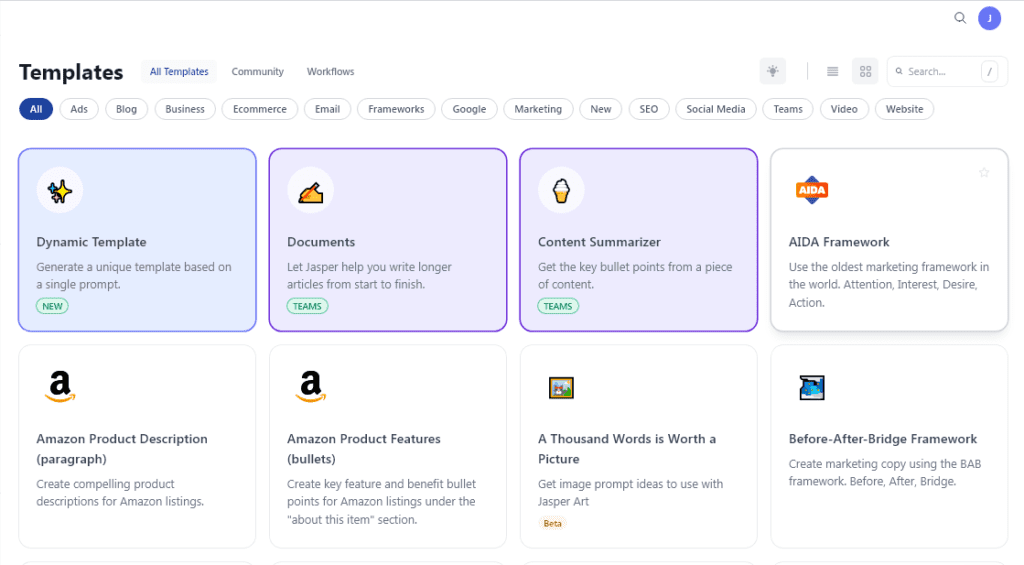
Jasper has been hailed as the finest AI writing assistant overall, dominating the industry with its remarkable features and caliber. Jasper starts by taking the seed words you provide, which it analyzes to create phrases, paragraphs, or documents depending on the topic and voice. It can write a 1,500-word piece in just fifteen minutes.
Pros of Jasper AI:
- Automation: AI tools like Jasper AI can automate various tasks, saving time and reducing the need for manual labor.
- Efficiency: They can process and analyze large volumes of data quickly, which can lead to more efficient decision-making and problem-solving.
- Consistency: AI models maintain a consistent level of performance and don’t get fatigued, making them reliable for repetitive tasks.
- Personalization: AI can be used to personalize user experiences, such as in content generation, marketing, or product recommendations.
- Scalability: AI can scale up to handle increasing workloads without a linear increase in resources.
- 24/7 Availability: AI models can operate 24/7, providing continuous support or services.
- Cost Reduction: Automation and increased efficiency can lead to cost savings in various business operations.
- Data Analysis: AI can uncover insights and patterns in data that might be challenging for humans to discover.
Cons of Jasper AI:
- Lack of Creativity: AI models like Jasper AI are rule-based and lack creativity. They can’t think outside the box or generate truly novel ideas.
- Dependence on Data: AI models require large amounts of high-quality training data to perform well. Biased or incomplete data can lead to biased or inaccurate results.
- Ethical Concerns: AI models can perpetuate and amplify biases present in the training data, leading to potential ethical issues.
- Security Concerns: Malicious use of AI, such as deepfake generation or automated cyberattacks, poses security threats.
- Limited Contextual Understanding: AI models may struggle with understanding context and nuance in human language, leading to errors in natural language understanding tasks.
- Maintenance and Updates: AI models require continuous maintenance, updates, and monitoring to ensure they remain accurate and secure.
- Privacy Concerns: The use of AI in data analysis and personalization can raise concerns about user privacy and data protection.
2. Copy.ai: best for AI social media copywriting

Copy.ai is a platform that provides AI-powered content generation services, such as generating marketing copy, blog posts, emails, and more, this AI content generator and writing helper promises to produce high-quality material in a matter of seconds. Simply choose from a collection of long- and short-form copy tools to help provide appropriate text and style recommendations based on your choice.
Pros:
- Time and Cost Efficiency: AI content generators can quickly produce content, saving you time on writing and brainstorming. This can potentially reduce the cost of hiring content creators or writers.
- Versatility: Copy.ai can generate various types of content, from marketing copy to social media posts, making it versatile for different needs.
- Consistency: AI-generated content is typically consistent in style and tone, which can help maintain brand identity.
- User-Friendly: Many AI content generators, including Copy.ai, are designed to be user-friendly, requiring minimal technical expertise.
Cons:
- Quality and Accuracy: AI-generated content may lack the nuance, context, or emotional depth that human writers can provide.
- Lack of Originality: AI tools can generate content based on existing data and patterns, potentially leading to unoriginal or clichéd content.
- Limited Creativity: AI may struggle with highly creative or abstract tasks that require a deep understanding of human experiences.
- Learning Curve: While user-friendly, some AI tools may still require some learning to get the best results and to fine-tune the generated content.
- Cost: The subscription cost of using AI content generators may not be justified for all users, particularly for small businesses or individuals with limited content needs.
- Dependence on Third-Party Services: Relying solely on AI-generated content may make you dependent on a third-party service, which can be risky if the service goes down or experiences issues.
- Dependence on Third-Party Services: Relying solely on AI-generated content may make you dependent on a third-party service, which can be risky if the service goes down or experiences issues.
3. WordAI

WordAi is an article-spinning and content-generation tool that uses artificial intelligence to rewrite text. Like any software or service, it has its pros and cons, which can vary depending on your specific needs and use cases. Here are some of the pros and cons of WordAi:
Pros:
- Automated Content Generation: WordAi can help you quickly generate content for websites, blogs, and other online platforms, saving you time and effort.
- AI-Powered Spinning: It uses advanced AI algorithms to rewrite content, making it unique and less likely to trigger duplicate content penalties from search engines.
- Quality Control: WordAi offers different quality settings, allowing you to balance between readability and uniqueness. This can be useful for various purposes, from SEO to content creation.
- Language Support: WordAi supports multiple languages, making it versatile for users in different parts of the world.
- Plagiarism Avoidance: By creating unique versions of your content, WordAi can help you avoid plagiarism issues.
Cons:
- Quality Concerns: While WordAi can generate content quickly, the quality of the output may not always meet your standards. It might produce content that is technically unique but lacks coherence or natural language flow.
- Manual Review Needed: You’ll often need to review and edit the generated content to ensure it’s accurate, contextually relevant, and free from errors. This can negate some of the time-saving benefits.
- Costly: WordAi is a paid service, and the cost can add up over time, especially if you require a high volume of content or frequent usage.
- Limited Creativity: The AI algorithms used in WordAi are not creative in the same way humans are. The content it generates might lack the nuance, creativity, and context that a human writer can provide.
- Potential SEO Risks: While WordAi aims to produce unique content, using spun content for SEO purposes can still be risky. Search engines are getting better at detecting low-quality or spun content, and you might not achieve the SEO results you desire.
- Ethical Concerns: Depending on how WordAi is used, it can raise ethical concerns, particularly if it’s used to create low-quality, spammy content or to deceive readers.
4. Rytr
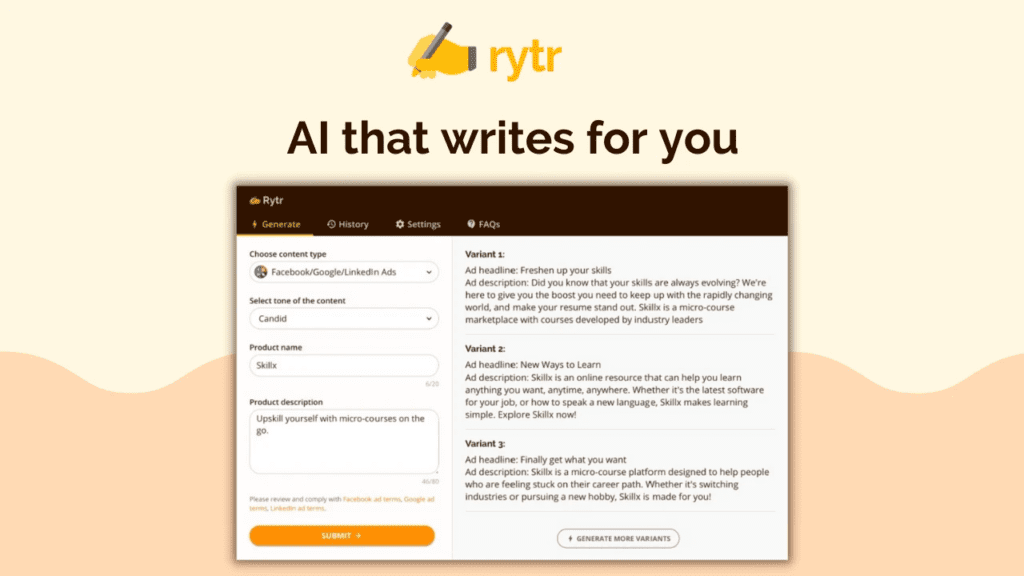
Rytr is an AI writing tool designed primarily for content writers, SEOs, and copywriters. It is based on OpenAI’s GPT-3 API.
The fact that the AI-powered writing assistant comes with built-in prompts and templates for more than 40 use cases—from crafting blog post briefs to producing Facebook Ad copy or social media posts—is one of its benefits.
Pros:
- Time-Saving: AI content generation tools can quickly produce a large amount of written content, saving writers and businesses time and effort.
- Consistency: AI can maintain a consistent tone and style throughout a document or series of documents.
- Cost-Effective: Using AI can be more cost-effective than hiring human writers, especially for repetitive or bulk content.
- Reduced Writer’s Block: AI can help writers overcome writer’s block by generating initial ideas or drafts.
- Multilingual Support: Many AI writing tools support multiple languages, making them valuable for businesses with global audiences.
- Plagiarism Prevention: AI can cross-check content to ensure it’s not inadvertently plagiarized.
Cons:
- Quality Concerns: While AI can generate content quickly, the quality may vary, and it might not match the nuance and creativity of human writing. Human editing is often required.
- Limited Creativity: AI tools are not well-suited for highly creative or abstract content, such as poetry or artistic writing.
- Loss of Personal Touch: Content generated by AI may lack the personal touch and emotional engagement that can come from a human writer.
- Accuracy Issues & Overuse of AI: AI may not always produce factually accurate content, and human oversight is necessary.
- Initial Investment: Some AI writing tools require a subscription or licensing fee, which can be an initial investment for businesses.
- Privacy Concerns & Learning Curve: Users may need time to learn how to use the AI tool effectively and get the desired results.
5. Copymatic
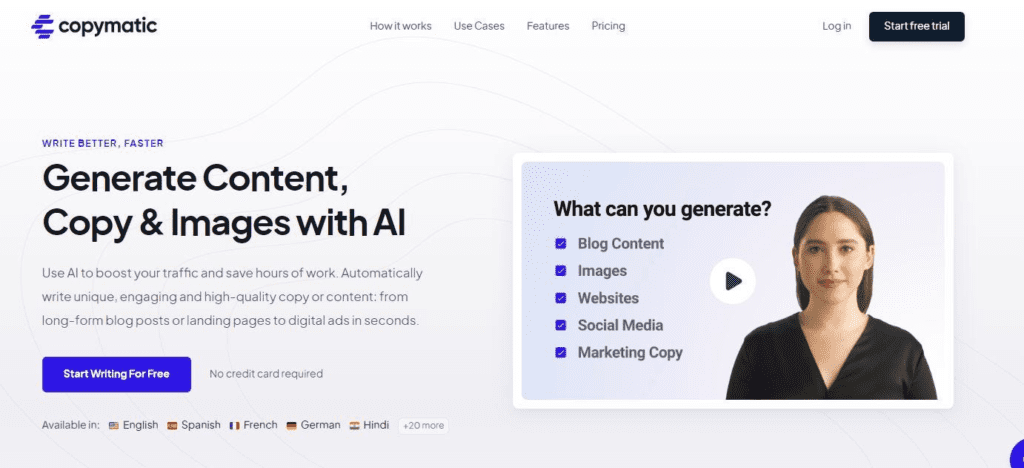
Copymatic is an AI tool that comes with AI picture generation and facilitates the development of content in more than 20 languages. With templates, text-to-speech capabilities, a chat feature, and an intelligent editor, it’s a flexible and user-friendly tool.
Price :
- Pro: $29 per user per month
- Team: $49 per month (up to 5 users)
- Enterprise: $99 per month (up to 25 users)
To evaluate the pros and cons of “copymatic.ai” or any similar AI-driven platform, you should consider the following factors:
Pros:
- Efficiency: AI-powered tools can generate content quickly, saving you time and effort in writing.
- Consistency: These tools can maintain a consistent tone and style throughout a document, which is important for branding and messaging.
- Cost-Effective: Using AI tools may be more cost-effective than hiring human writers for certain tasks.
- Availability: AI tools are available 24/7, providing content on-demand.
Cons:
- Quality: AI-generated content may not match the quality of human-written content, particularly for creative or nuanced writing.
- Originality: It can sometimes produce content that is too similar to existing materials, which can lead to issues with plagiarism or unoriginality.
- Lack of Context: AI may not fully understand the context or nuances of specific industries or topics, leading to inaccuracies or irrelevant content.
- Privacy and Data Concerns: Using such tools may involve sharing sensitive information, and there may be concerns about data privacy and security.
- Dependency: Overreliance on AI for content generation can hinder the development of human writing and creative skills.
6. Quillbot

QuillBot is a popular online writing and grammar tool that provides various services, primarily focused on paraphrasing and improving the quality of written content. Like any software or service, it has its own set of pros and cons:
Pros:
- Paraphrasing and Rewriting: QuillBot is designed to help users rephrase and reword sentences, making it useful for avoiding plagiarism and improving the originality of your writing.
- Grammar and Spelling Check
- Vocabulary Enhancement
- Ease of Use
- Integration
- Multiple Languages
Cons:
- Accuracy: While QuillBot is capable of rephrasing sentences, it doesn’t always produce accurate or contextually appropriate results. This can lead to unintended changes in meaning.
- Overreliance: Relying too heavily on QuillBot may hinder your writing and critical thinking skills. It’s important to use it as a tool for assistance rather than a crutch.
- Subscription Cost: QuillBot offers a free version with limited features, but to access the full range of services, a subscription is required, which may not be affordable for everyone.
- Privacy Concerns: Users should be cautious about sharing sensitive or private information on the platform, as they might be subject to the company’s data policies.
- Limited Creativity: Using QuillBot’s suggestions might result in writing that lacks creativity and originality, as it tends to offer straightforward, safe alternatives.
7. Simplified
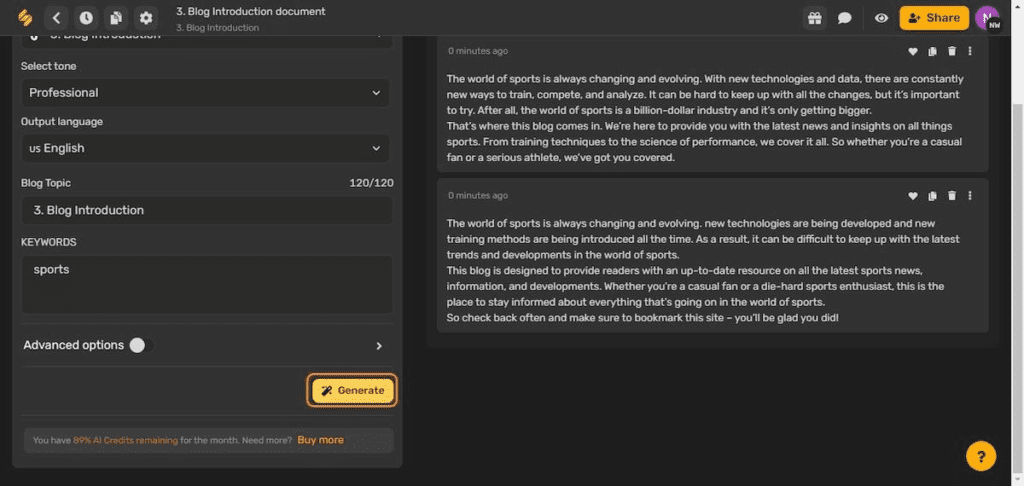
Simplified is your ultimate all-in-one app, meticulously crafted for modern marketing teams. With a seamless blend of creativity and efficiency, platform empowers collaboration and supercharges content creation like never before.
Pros:
- Clarity: Simplification often leads to clearer communication. Removing unnecessary complexity can make information easier to understand, especially for a broad audience.
- Accessibility: Simplified content can be more accessible to a wider range of people, including those with limited background knowledge or cognitive impairments.
- Efficiency: Simplification can lead to more efficient processes. Reducing unnecessary steps or complexity in a system can save time and resources.
- Reduced Errors: Simplifying complex tasks or processes can reduce the likelihood of errors. When things are straightforward, there’s less room for misunderstandings or mistakes.
- Cost Savings: Simplifying products, services, or operations can lead to cost savings. Fewer components, less training, and lower maintenance can all reduce expenses.
Cons of Simplification:
- Loss of Detail: One of the most significant drawbacks of simplification is the loss of important details. When you simplify, you might omit valuable information or context.
- Inadequate for Complex Tasks: Simplification is not suitable for highly complex tasks or subjects. Trying to oversimplify complex problems can lead to oversights or inaccurate solutions.
- Resistance to Change: Some people may resist simplification, particularly if it means changing established practices or systems. This resistance can hinder the adoption of simplified solutions.
- Limited Customization: Simplified solutions often offer limited room for customization. This can be a disadvantage for individuals or organizations with specific needs that are not met by the simplified version.
- Potential for Over-Simplification: Over-simplification can lead to misunderstanding or misrepresentation of information. In some cases, oversimplifying can result in overly optimistic or unrealistic expectations.
8. Frase

Frase is an all-in-one AI content generator and optimization solution that blends SEO research and AI writing. That is advantageous for content managers and SEOs who require a complete solution to produce briefs rapidly. You can oversee the entire content lifetime using Frase, from research to optimization, for generating ideas for your blogs, etc.
Pros:
- Time-Saving Content Creation: Frase.ai can automate various aspects of content creation, such as research, topic generation, and content optimization, which can save content creators a significant amount of time.
- SEO Optimization: Frase.ai helps users improve their website’s search engine optimization (SEO) by identifying relevant keywords, generating content recommendations, and ensuring that content aligns with SEO best practices.
- Content Quality Improvement: The platform can help businesses produce high-quality and well-researched content by providing relevant information and data to support the content creation process.
- Competitive Analysis: Frase.ai allows users to analyze their competitors’ content strategies and identify opportunities to create better and more relevant content.
- Content Strategy Insights: Users can gain insights into what topics are trending or have high search volume, helping them make informed decisions about their content strategy.
- User-Friendly Interface: The platform is designed to be user-friendly and accessible to both experienced content creators and those new to SEO and content optimization.
Cons:
- Cost: The pricing of AI-powered content optimization tools like Frase.ai can be a significant expense for small businesses or individuals, making it less accessible to those with limited budgets.
- Content Originality: While Frase.ai can assist in content creation, it’s important to ensure that the content generated remains original and unique. Relying too heavily on AI-generated content can result in generic or duplicated material.
- Limited Human Creativity: AI tools like Frase.ai can provide data-driven content suggestions, but they may lack the creative and emotional aspects that human writers can bring to content, potentially resulting in content that lacks a personal touch.
- Platform Learning Curve: Some users may find that there is a learning curve associated with using AI-powered content optimization tools effectively, and it may take time to fully harness their capabilities.
- Content Accuracy: While AI can assist in research and content creation, it may not always provide the most up-to-date or accurate information. Users should verify the information generated by the tool.
- Integration Challenges: Depending on your existing content management system and workflow, integrating Frase.ai may require some technical adjustments and effort.
9. Narrato
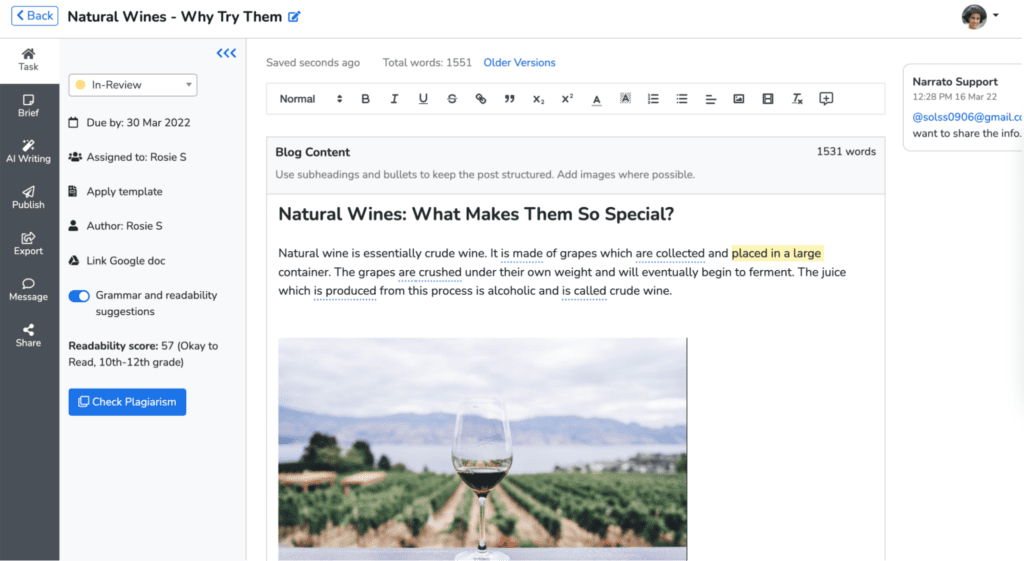
Though not in the field of content marketing, Narrato is a relative newcomer to the writing AI tools sector. Using the Narrato Marketplace, content managers and SEO experts may develop briefs, assign them to authors, and oversee the content workflow with this AI solution for content writing and copywriting.
Pros
- Accessibility
- Time Efficiency
- Multilingual Support
- Consistency
- Cost-Effective
- Available 24*7
Cons
- Lack of Emotional Depth
- Quality Variability
- Limited Context Understanding
- Limited Customization
- Copyright and Licensing & Ethical Concerns
- Lack of Personalization
10. Surfer SEO
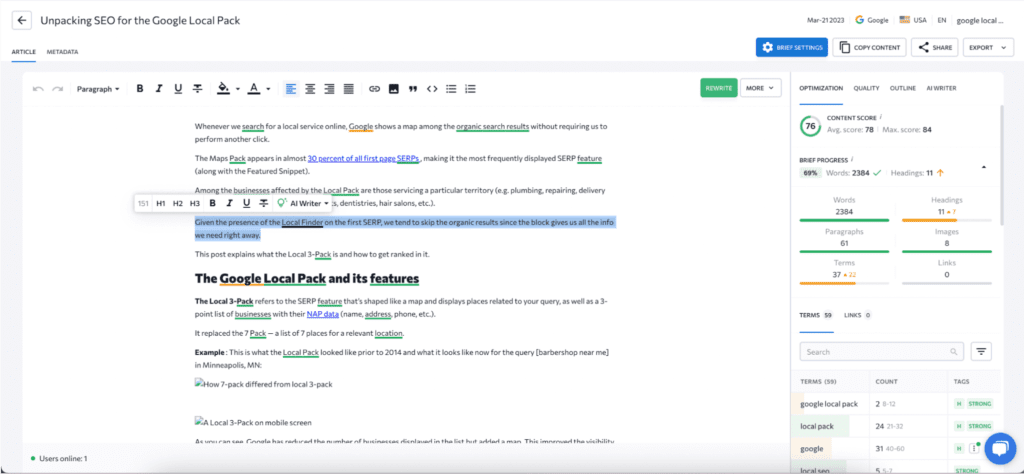
Surfer SEO is a popular on-page SEO tool designed to help optimize web content by analyzing top-ranking pages for a given keyword and providing recommendations to improve your content. Like any tool, it has its pros and cons:
Pros of Surfer SEO:
- Data-Driven Analysis: Surfer SEO provides data-driven insights by analyzing top-ranking pages, including keyword usage, content length, backlinks, and more.
- Content Optimization: It offers specific recommendations for optimizing your content based on the analysis, such as keyword density, word count, and LSI keyword suggestions.
- Competitor Insights: You can see what your competitors are doing right, helping you identify gaps in your content strategy and areas for improvement.
- User-Friendly Interface: Surfer SEO has an easy-to-navigate interface, making it accessible to both beginners and experienced SEO professionals.
- Keyword Research: It offers keyword research and analysis tools to help you discover valuable keywords and assess their competitiveness.
- Integration: Surfer SEO can be integrated with various popular SEO tools and content management systems, such as WordPress, which can streamline your workflow.
- Customization: Users have the flexibility to fine-tune their optimization settings to match their specific goals and preferences.
Cons of Surfer SEO:
- Pricing: Surfer SEO can be relatively expensive, especially for smaller businesses and individuals. The cost may be prohibitive for those on a tight budget.
- Learning Curve: While the interface is user-friendly, understanding and using the tool effectively may require a learning curve, particularly for beginners in SEO.
- Limited Backlink Analysis: Surfer SEO primarily focuses on on-page optimization and doesn’t provide extensive backlink analysis. You’ll need to use other tools for this aspect of SEO.
- Algorithm Limitations: Like any SEO tool, Surfer SEO’s recommendations are based on its algorithm and data sources. It may not always provide perfect guidance and may not consider other important factors specific to your website.
Not a Complete SEO Solution: Surfer SEO is primarily an on-page SEO tool. It doesn’t cover all aspects of SEO, such as technical SEO, off-page SEO, or social media marketing.


